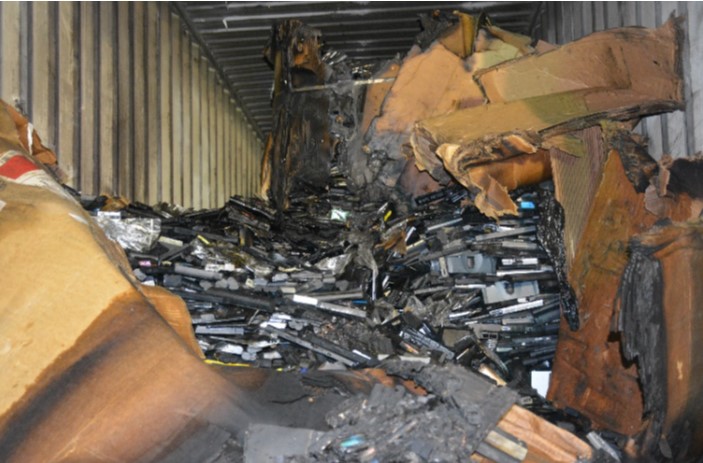- IP Code: Mandatory Code enters into force on 1 July. Make sure your company is up to speed with the changes.
- Early Bird tickets available for the IMCA Global Summit 2024. 3-4 December, Utrecht, Netherlands. Members can save £400.
- Discover how we are helping Members reduce emissions: Explore the ProjectGHG hub now.
- Now booking. Join the Lifting and Rigging community at our Technical Seminar in Amsterdam. Thursday 12 September 2024
- Now booking. Underwater Ship Husbandry Seminar. 10 October 2024, Singapore.
USCG: Lithium battery fire
The United States Coast Guard (USCG) has published Safety Alert 01-22 relating to a Lithium battery fire in a freight container whilst en route to a port for trans-shipment to a vessel.
What happened
In August 2021 a container illegally loaded with discarded Lithium batteries caught fire while en route to the Port of Virginia in the United States. The container was being transported to port with the intent that it would be shipped to China aboard a container ship. The batteries caught fire on the highway resulting in loss of the cargo, and significant damage to the shipping container.

What was the cause?
Upon initial investigation, the fire department determined that the heat produced from the fire burned hot enough to burn or melt a hole through the freight container’s structure. In addition, the bill of loading listed “computer parts,” not Lithium batteries. This is a situation that made responding to the fire more challenging and could have been potentially catastrophic had the container caught fire after being loaded aboard the container ship.
Further investigation determined that the shipper had failed to properly placard, label, mark and package the lithium batteries, class 9, UN 3480 and 3481. The cause of fire was determined to be residual charge/full circuit, which led to a thermal increase.
Actions
Lithium batteries are inherently hazardous and should be treated with the greatest respect. IMCA members have reported a number of incidents of injuries, fires and explosions caused by mishandling of Lithium batteries.
- Ensure damaged/defective Lithium batteries are appropriately and properly packaged for disposal and/or recycling according to applicable legislation;
- Be aware of how to address additional marking requirements for Lithium batteries being transported and Lithium batteries that are damaged or defective, or being disposed of or recycled;
- Ensure that Lithium batteries prepared for transportation are protected against short circuit;
- Ensure that Lithium batteries are stored appropriately.
Members may wish to refer to:
- Incidents where containers were inappropriately loaded or cargo not properly secured:
- Near miss fire – epoxy overheating [old epoxy was stored at the back of a freight container]
- Lithium battery issues
- Lithium Battery Guide For Shippers – USDOT
- United States Environmental Protection Agency (EPA) guidance on Used Lithium-Ion Batteries
- The International Maritime Dangerous Goods (IMDG) Code
Safety Event
Published: 8 April 2022
Download: IMCA SF 09/22
IMCA Safety Flashes
Submit a Report
IMCA Safety Flashes summarise key safety matters and incidents, allowing lessons to be more easily learnt for the benefit of all. The effectiveness of the IMCA Safety Flash system depends on Members sharing information and so avoiding repeat incidents. Please consider adding [email protected] to your internal distribution list for safety alerts or manually submitting information on incidents you consider may be relevant. All information is anonymised or sanitised, as appropriate.
IMCA’s store terms and conditions (https://www.imca-int.com/legal-notices/terms/) apply to all downloads from IMCA’s website, including this document.
IMCA makes every effort to ensure the accuracy and reliability of the data contained in the documents it publishes, but IMCA shall not be liable for any guidance and/or recommendation and/or statement herein contained. The information contained in this document does not fulfil or replace any individual’s or Member's legal, regulatory or other duties or obligations in respect of their operations. Individuals and Members remain solely responsible for the safe, lawful and proper conduct of their operations.
